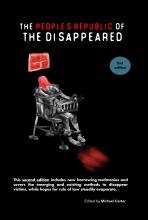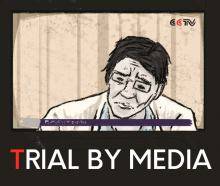Tiger chairs, torture and forced confessions: digging beneath China’s kidnapping of a British consulate staffer

 Following the explosive revelations of torture at the hands of Chinese state security agents by former British HK consulate worker Simon Cheng earlier this week, we talk with Safeguard Defenders founder and director Peter Dahlin.
Following the explosive revelations of torture at the hands of Chinese state security agents by former British HK consulate worker Simon Cheng earlier this week, we talk with Safeguard Defenders founder and director Peter Dahlin.
Mr. Dahlin, who was also kidnapped and held by Chinese state security agents in 2016 when he co-ran a rights NGO called China Action, shares his own experiences to help shed more light on Mr. Cheng’s ordeal.
After the Q&A was recorded, Chinese state media released one clip of one of the many “confession” videos Mr. Cheng was forced to record. Mr. Dahlin told Hong Kong Free Press that: “This is an edited statement procured after torture while Simon was held incommunicado in solitary confinement, and whatever words are spoken are meaningless… “
Q: What does it feel like to be locked into a tiger chair?
 Peter Dahlin: “Having been locked into a tiger chair for my own nightly six-hour interrogations that went on for weeks I can certainly say that it is painful. If they used manacles on his ankles and handcuffs on his wrists, that would have made it even more so.
Peter Dahlin: “Having been locked into a tiger chair for my own nightly six-hour interrogations that went on for weeks I can certainly say that it is painful. If they used manacles on his ankles and handcuffs on his wrists, that would have made it even more so.
“These chairs are designed to restrain the body in an unnatural position, and it has a slow but very efficient way to weaken your body over longer periods of time.”

"During the interrogation, I was in a cell siting on a steel “tiger chair.” I had been buckled up on the chair and cannot move."
Simon's testimony
Q: Mr. Cheng was forced to make multiple confessions, some of them written, some of them also videoed, for a range of fake crimes. Why is China so obsessed with confessions?
 Peter Dahlin: “Confessions are king in China, and that’s why they have a 99.93% conviction rate (and that’s not even counting secret trials). More or less everyone confesses, whether its a politically charged crime or not, as everyone knows they will be convicted anyway. Confessing simply means a lesser punishment.
Peter Dahlin: “Confessions are king in China, and that’s why they have a 99.93% conviction rate (and that’s not even counting secret trials). More or less everyone confesses, whether its a politically charged crime or not, as everyone knows they will be convicted anyway. Confessing simply means a lesser punishment.
“Unless you are willing to be a martyr, everyone charged with national security crimes will confess, and the time spent in custody before trial tends to be counted in years, not months, with torture more or less guaranteed.
“Many are first placed in 'RSDL' before arrest, meaning they are disappeared for up to six months, and our [Safeguard Defenders] database and interviews with victims show torture in more than 98% of known cases.
“Two senior police officers also sit in front of me, asked me to sit on a soft pad chair, and handed me a script (which the questions and answers were totally designed by them in advance) for filming my “confession” and “testimony” against a well-decorated background."
Simon’s testimony
For more on China’s forced TV confessions please see our book of testimonies, Trial by Media and our ground-breaking report Scripted and Staged [pdf].
Q: Mr. Cheng was hung in a cross shape with cuffs for hours, forced to squat in an excruciating position for hours and beaten with what felt like sharpened batons.
Can you talk a little bit about the role torture plays in these cases?

Peter Dahlin: “I wasn't physically tortured myself – but human rights defenders in China are almost always tortured – but I did hear one of my Chinese colleagues being tortured on the floor above me. They tortured him for the same reason they tortured Simon - confessing about espionage - in my case they wanted my co-worker to confess that I was a spy, first for Sweden, later for the EU.
When he refused, they took him from the interrogation room across the hall to his suicide-padded isolation cell, and beat him up. After that, he did indeed confess. Afterwards, he said in astonishment that they were so damn professional - they could cause so much pain without leaving any marks thet were too obvious."
“I was hung (handcuffed and shackled) on a steep X-Cross doing a spread-eagled pose for hours after hours. I was forced to keep my hands up, so blood cannot be pumped up my arms. It felt extremely painful.”
Simon’s testimony
For more on China’s use of torture, please see our report: Battered and Bruised.
Q: What do you make of the ‘prostitution’ charge?
Peter Dahlin: “Typically, if the Ministry of State Security (MSS) is involved, they tend to publicly attack the victim with either prostitution, corruption or alignment with anti-China forces.
“Key is for them to tear down the victims reputation, their standing in the community, so either of these three lines of attacks tend to be used.”
Q: Mr. Cheng said that even though they accused him of ‘spying’ for Britain, just before he was released, agents tried to persuade him to ‘spy’ for China. What do you make of this?
 Peter Dahlin: "Simon being pressured to become a spy, or 'mole', is quite common.
Peter Dahlin: "Simon being pressured to become a spy, or 'mole', is quite common.
There is a section of MSS that specifically monitors so-called returnees, that is, Chinese who have studied abroad, with the aim of using those people as future spies. It can also be applied to those working abroad for foreign institutions.
It happened to one of the Chinese assistants to my former NGO China Action. This person, a recently returned graduate from the west, spent six months being dragged in to hotels regularly by MSS subjected to constant threats and enticements to become a spy or a mole to be used against the NGO."
Q: Mr. Cheng said his treatment improved a week or so into his disappearance and that he believes it was to do with media. Does media attention help victims?
Peter Dahlin:  “In the end, growing media and diplomatic pressure forced the police to conclude his case as soon as possible, which is why he was 'allowed' to confess to prostitution and then let go.
“In the end, growing media and diplomatic pressure forced the police to conclude his case as soon as possible, which is why he was 'allowed' to confess to prostitution and then let go.
“His case does not bode well for the UK, as it shows clearly that China is desperately trying to find a way to blame the UK for the ongoing unrest in Hong Kong, as a way to deflect blame.
“Simon is likely not the last victim of the growing discord between the UK and China over Hong Kong, and the next one will likely end up in 'RSDL', and simply disappear, like Canadians Michael Kovrig and Michael Spavor, and Australian Yang Hengjun.”
On 24 August... "they [regular detention centre police] did treat me slightly better than the secret police in general, and the later interrogators had shown slightly gentler manner than the earlier interrogators. I believe the media coverage had changed their attitude."
Simon's testimony